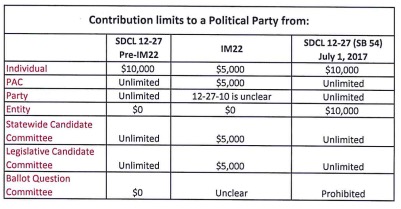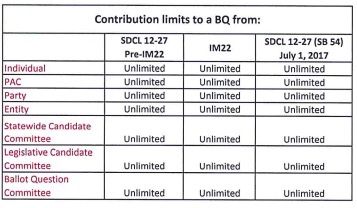Last updated on 2017-09-14
The Government Accountability Task Force, which was created by Senate Bill 171 to study campaign finance and held its first meeting yesterday, shares the Secretary of State’s great service of summarizing South Dakota’s basic campaign finance requirements in one handy-dandy three-page guide.
The tables comparing previous campaign finance law to the amended law confirms my analysis during the Legislative Session that, far from honoring the will of the voters and putting more restrictions on big money politics, self-serving legislators essentially restored the lax status quo with some tweaks to put more money in their campaign coffers. Consider these tables comparing the status quo, the campaign finance limits that voters approved but Republicans repealed in Initiated Measure 22, and the rules included in SB 54, which kick in on July 1:
Every lower campaign finance limit that voters approved in IM 22 is gone. Almost every limit previous to IM22 is restored by SB 54. Businesses and unions (referred to as “entities”) can now donate directly to candidates and parties, in addition to the money they can funnel into campaigns via PACs. And for all the Republican concerns about too much money being spent on ballot measures, they make sure to lift the previous ban on PAC contributions to ballot question committees.
In preparing these charts, the Secretary of State did make some errors. She characterizes the rules on contributions from ballot question committees as “unclear”. This is incorrect:
- IM 22 Section 5 said, “No candidate for statewide office may accept a contribution from a ballot question committee.”
- IM 22 Section 6 said, “No candidate for legislative or county office may accept a contribution from a ballot question committee.”
- IM 22 Section 7 maintained the prohibition on contributions to PACs from ballot question committees but phrased it more clearly: “A political action committee may not accept contributions from a ballot question committee.”
- IM 22 Section 8 similarly clarified the prohibition on ballot question committees’ contributions to parties: “A political party may not accept contributions from a ballot question committee.”
The past performance presented in these summaries indicates we should not expect this interim committee to produce any major reforms limiting big money in South Dakota politics.




